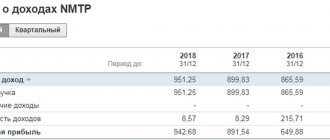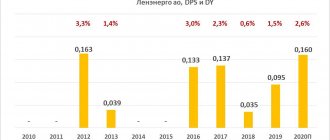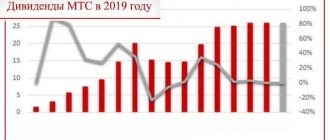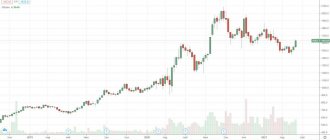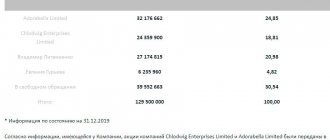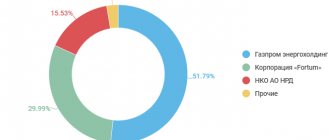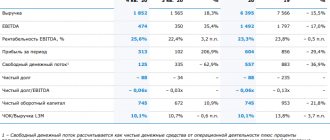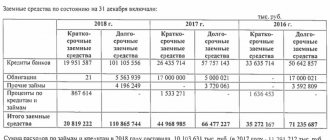Far Eastern MP. Issuer analysis
The Far Eastern Sea Port Group (FESCO or FESCO) is one of the largest private transport and logistics companies in Russia. The group operates in the port, railway and logistics business.
Shareholders
At the end of the first half of 2021, FESCO shareholders were:
In early October, GHP Group sold a 23.8% stake in the company, RBC reported. The buyers were not disclosed.
Financial indicators
Revenue and EBITDA
The company's operating activities are carried out by five divisions: linear and logistics, port, railway, marine and bunkering.
The activities of the directions are closely integrated, which allows FESCO to provide intermodal transportation services - that is, using two or more types of different vehicles during transportation.
FESCO's financial results for 2021, broken down by division, are presented as follows:
The largest division is linear logistics. It integrates the activities of other divisions, including port transshipment and rail transportation. The EBITDA margin of the area at the end of 2021 was only 6%.
From the point of view of profit generation or EBITDA, the most significant are the port and railway divisions. The port direction is represented by the Vladivostok Sea Trade Port (VMTP), the railway direction is represented by the Transgarant and Russian Troika brands.
EBITDA of these areas for 2021 formed 85% of the group’s EBITDA, despite the fact that the share in revenue was only 42%.
In terms of dynamics, FESCO's revenue has been growing in recent years, although the growth rate is unstable. At the end of 2021, the group's revenue decreased by 1% due to a decline in the railway division in the grain segment. At the beginning of 2021, FESCO sold Trans-Grain LLC, an operator of grain trucks.
At the same time, stable growth was observed in other segments.
EBITDA dynamics are growing, the key driver is the increase in the volume of intermodal transportation and transshipment through VCSP - one of the most marginal areas.
Net profit
In 2014–2015 the company faced the negative consequences of the introduction of sanctions against the Russian Federation, a strong drop in trade turnover, worsening market conditions, and exchange rate fluctuations. Because of this, the company suffered large losses. As the situation stabilized, net profit returned to positive territory. The drawdown in 2019 is of a paper nature and is associated with the impact of currency revaluations.
FESCO generates about 50% of its revenue in foreign currency, so the weakening of the ruble is generally positive for the company, despite one-time paper losses due to exchange rate differences.
Impact of coronavirus. At the end of the first half of 2021, the group reduced EBITDA by 10% y/y, revenue remained at the previous year level. The pandemic did not have any serious consequences.
Debt load
Net debt at the end of the first half of 2021 amounted to RUB 33.9 billion, having decreased by 3% from the end of 2021. The net debt/EBITDA ratio was at 3x versus 2.9x at the end of 2021. The debt burden decreased relative to net debt/EBITDA in the region of 9–11x in 2015–2017. About 50% of the company's debt at the end of 2019 was denominated in foreign currency.
Due to market volatility in 2014–2015. FESCO had to greatly increase its debt. In 2021, the company defaulted on its bonds. Since then, the bond issues have been restructured, and the debt burden has gradually stabilized following the growth of EBITDA.
To date, the debt has dropped by almost 2 times from the maximum of 2017.
However, the unpleasant precedent with bonds, as well as the low level of equity capital and low credit rating (CCR from Fitch) have become the reasons that the cost of borrowing for FESCO is quite high - most of the debt requires interest payments at LIBOR/Bank of Russia +7–12 %. The effective interest rate at the end of the first half of 2021 was around 11%, in 2021 - at 13%.
On the one hand, high borrowing costs negatively impact net profits and cash flows. But on the other hand, the company has the opportunity to gradually restructure its debt, freeing up funds for further deleveraging.
FCF
FESCO's free cash flow before interest payments has been positive in recent years.
However, the FCF indicator after servicing loans and borrowings is more representative.
Until recently, the company used all FCF to pay off interest on loans, and only at the end of 2021 did the FCFE LTM indicator enter positive territory.
It is also interesting to consider the FCF after interest and debt extinguishment (FCFE).
It can be seen here that the company uses the entire FCF and even funds above it to pay off the debt load. The peak value at the end of 2018 is associated with the sale of a 25% stake in TransContainer to FESCO for RUB 14.8 billion. — all this money was spent on deleveraging.
Conclusion: the company has passed the acute phase of financial problems, the debt burden has decreased, but overall remains quite high. There is enough cash flow to pay interest, but there is little cash left to pay off the principal. As revenue grows and equity capital increases, the group will be able to gradually reduce the cost of debt.
Dividends and buyback
FESCO does not pay dividends or conduct buybacks. The company uses all available funds to pay off interest on loans and reduce the debt burden. The current dividend policy does not provide accurate guidance on the potential size of payments in the future.
Animators
To understand how fairly the company is valued relative to its competitors, let’s compare FESCO’s key multiples with its peers on global markets.
Noteworthy is the almost 20-fold revaluation of FESCO in terms of P/BV relative to the sample median. This is due to the fact that the company's capital decreased significantly due to losses in 2014–2015. Partly because of the high multiple, the group's borrowing costs are high.
Conclusion: according to most multiples, the group is valued relatively fairly, especially considering the relatively recent problems with debt burden, corporate conflict and country discount. A small discount in EV/EBITDA and P/E is offset by a strong revaluation in P/BV and the negative impact of the shareholder conflict on capitalization.
Shareholder conflict
In the fall of 2021, Arkady Korostelev was appointed President of FESCO. Shortly after this, the company announced that it intended to collect from a number of shareholders the debt for loans issued by them to buy back the group's shares in 2012. Claims were filed in a London court against companies associated with Ziyavudin Magomedov.
Historical digression: the FESCO group was acquired under the Leveraged Buyout scheme - the company provided loans to its future owners (Ziyavudin Magomedov and the American investment fund TPG Group) to buy out its own shares. The transaction amount was not disclosed at that time. In May, the company sent a letter to shareholders reminding them of the need to repay the group’s loans totaling $1.046 billion, RBC reported.
In parallel with this, internal investigations were initiated against all managers and directors of FESCO and its subsidiaries. The company reported that “during the audit, a number of gross violations, financial abuses and attempts to infringe on the rights of minority shareholders by Magomedov’s representatives were revealed.” Soon, FESCO announced the termination of the powers of VMTP General Director Zairbek Yusupov.
Ziyavudin Magomedov, who is currently under investigation, blamed the management, RBC reported.
At the same time, the FESCO group posted on its website an appeal from shareholders controlling 33.9% of the capital - DOMIDIAS LTD, NovatorInvest LLC, Nautilius LLC - that “there was no raider takeover of FESCO. A change of management was made due to the expiration of the previous composition of directors.”
Conclusion: Shareholder conflict and corporate reshuffles pose additional risks for investors.
Drivers of growth
Organic development
The average annual growth rate of the global container shipping market until 2027 is projected at 4.3%. The volume of container traffic in Russia in January-November 2021 increased by 10% compared to the same period last year, said Maxim Shishkov, head of the FESCO strategic marketing department. Traffic volumes may come under pressure in 2021, but trade activity with China is expected to increase over the next few years.
Claim against shareholder
The exact size of the claim filed against the largest shareholder Ziyavudin Magomedov is not indicated, but it can be assumed that this is an amount in the region of $1 billion. Thus, the size of the claim is 2.3 times the net debt of FESCO at the end of the first half of 2021 and 6 .7 times annual EBITDA.
If the court sides with the company, FESCO's financial condition may greatly improve, but the final amount of compensation may be reduced. It is possible that the defendant will not be able to fully return the indicated amount. The legal process can take a long time.
Possibility of selling the company
Earlier, the UAE government-controlled port operator DP World together with RDIF, as well as Sergei Shishkarev’s Delo group, expressed interest in purchasing FESCO.
DP World has been interested in FESCO since 2021. The port operator’s first application to purchase a stake in FESCO was not approved by the FAS. Coordination was required, since VCSP is a strategic facility for the Russian Federation. In October 2021, Vedomosti reported that DP World, in a consortium with RDIF, was again bidding to purchase FESCO.
Given DP World's persistence in entering the asset, one can assume that the company is serious. The estimated size of the transaction could be 49% of the capital - this is a large package, so the price will probably be higher than the market valuation of FESCO shares. And since, if the transaction is completed, changes in the shareholder structure will exceed 30%, then according to the law, an offer must be made to FESCO shareholders.
Sergei Shishkarev's Delo group is also interested in acquiring FESCO. The key incentive for entering the capital is the synergy with TransContainer, which the company recently acquired.
Conclusion: a possible repayment of a loan issued to shareholders or a potential transaction to purchase the group could trigger a strong positive revaluation of FESCO shares. But so far there is no certainty about these events.
Summing up
FESCO shares are investments with a high level of risk.
The company is interesting from the point of view of the growing container shipping market and strengthening trade relations with China. Also in the group’s case there are several strong potential drivers, if implemented, the securities could be positively revalued.
On the other side of the scale is a relatively high debt burden and negative free cash flows. It is difficult to expect dividends from FESCO in the coming years. Additional risks come from corporate conflict and lack of mutual understanding between major shareholders. The liquidity of FESCO shares is quite low - this may make it difficult to enter or exit the securities without losing value.
Compared to its competitors, FESCO shares are fairly valued.
BCS World of Investments
Interim dividends of PJSC Novoship for 9 months. 2021
Abbreviated corporate name of the issuer: PJSC Novoship
Date of occurrence of the event (material fact) about which the message was compiled (if applicable): 11/08/2018
2. Contents of the message
1. Type of the general meeting of shareholders of the issuer:
Extraordinary general meeting of shareholders.
2. Form of holding the general meeting of shareholders:
Absentee voting.
3. Date of the general meeting of shareholders (end date for receipt of voting ballots):
December 14, 2021.
4. Postal addresses to which completed voting ballots can be sent:
• 107076, Moscow, st. Stromynka, 18, building 5B (JSC Nezavisimaya Registrarskaya Nezavisimaya Registrarskaya About Joint-Stock Companies) a notice of holding an extraordinary general meeting of shareholders of PJSC Novoship should be sent by registered letters to shareholders no later than 21 days before the meeting.
• Determine the list of materials to be presented to persons entitled to participate in the general meeting of shareholders: notice of an extraordinary general meeting of shareholders; a copy of the minutes (extract from the minutes) of the Board of Directors of the Company on recommendations on the amount of dividends on the Company’s shares and the procedure for their payment; draft decision of the extraordinary general meeting of shareholders on the agenda item; voting ballot at the extraordinary general meeting of shareholders.
• In accordance with paragraph 3 of Art. 52 of the Federal Law “On Joint-Stock Companies” to provide persons entitled to participate in the general meeting of shareholders with access to the above materials for review at the Company’s premises and at the Company’s registrar’s premises within 20 days before and during the meeting.
4. Contents of decisions adopted by the Issuer’s Board of Directors: 1. Guided by paragraphs. 4 – 6, 8 tbsp. 42, sub. 11 clause 1 art. 65 of the Federal Law “On Joint-Stock Companies”, to recommend to the extraordinary general meeting of shareholders:
1.1. Make a decision to pay dividends based on the results of nine months of 2021 on ordinary and preferred shares in cash in the amount of RUB 3.90. (three rubles ninety kopecks) for each share within the following periods:
• nominee holders and trustees who are professional participants in the securities market and are registered in the register of shareholders - no later than 10 business days from the date on which persons entitled to receive dividends are determined;
• other persons registered in the register of shareholders - no later than 25 working days from the date on which persons entitled to receive dividends are determined. 1.2. Set December 25, 2018 as the date on which persons entitled to receive dividends on shares of PJSC Novoship are determined. 2. In accordance with the requirements of paragraph 1 of Art. 54 of the Federal Law “On Joint Stock Companies” to approve the form and text of the voting ballot at the extraordinary general meeting of shareholders of PJSC Novoship on December 14, 2018.

